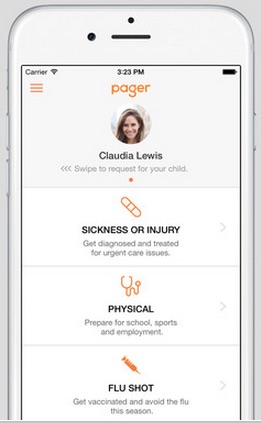 Pager, which offers an app consumers can use to request in-person physician house calls, has raised $10.4 million according to VentureBeat. The round was put up by existing seed investors Lux Capital and Montage Ventures, and new investors Goodwater Capital and Summation Health Ventures.
Pager, which offers an app consumers can use to request in-person physician house calls, has raised $10.4 million according to VentureBeat. The round was put up by existing seed investors Lux Capital and Montage Ventures, and new investors Goodwater Capital and Summation Health Ventures.
New York City-based Pager, which launched last May, is one of many startups to have called itself an “Uber for doctors”, but it may have a greater claim to that label than others: One of the company’s founders, Oscar Salazar, was also on Uber’s founding team. The company currently operates only in New York, but has plans to expand out to other metropolitan areas. Doctors do an initial consult over the phone to determine what sorts of diagnostic and treatment tools they might need to bring, then show up at the patient’s house for the visit.
The service currently costs $49 for the first visit and $199 for each visit after that. If the condition turns out to be treatable over the phone, customers are only charged $25. Otherwise, the price is fixed, no matter what treatment the patient ends up needing. Users can get reimbursed for Pager as an out-of-network provider, and the company is working on becoming an in-network provider under some plans.
“What Pager has done is they’ve created bags, basically, that would allow the doctor to do high-tech imaging or lab or evaluation of the patient right at the bedside,” Chief Medical Officer Richard Boxer said at an mHealth Summit session last December. “It’s not your grandfather or you father’s house call. But the regulatory issues disappear. The main problem with connected health is there are regulatory agencies in different states which demand that you have a face-to-face evaluation. If you, in fact, deliver a doctor to a patient, you have eliminated all the regulatory issues.”
The VentureBeat report says the funding will be used to expand the company into new markets beyond New York City, to add new connected devices to the doctors' toolbags, and, interestingly, integrating it's existing systems with insurance companies.
"Technology has advanced and evolved very, very quickly, but people haven’t evolved very much," Boxer said last year. "And people still crave a face-to-face interaction with a doctor."
















